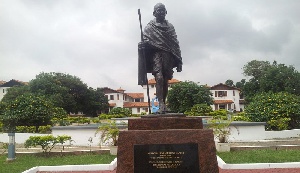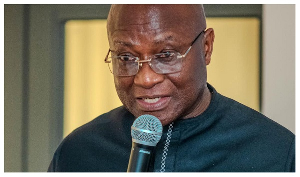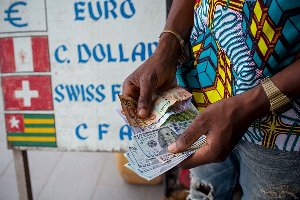By Francis Kwarteng
“For there are Danquah-hating characters on the campus of the University of Ghana who, based on the blighted logic of anti-Gandhi faculty members like Professors Akosua Adomako Ampofo and Obadele Kambon, ought not to be teaching at Legon.”
Our take
A casual reading of the afore-cited quotation might seem as though it was “dictator” Kwame Nkrumah who made it. That is not the case, however. That is, Nkrumah was not the author of this statement. Ironically, it comes from the schizophrenic journalist Kwame Okoampa-Ahoofe.
The Nassau Community College where he teaches journalism does not condone ethnocentrism, racism, discrimination and bigotry of any sort, yet this Joseph Goebbels of a journalist continues to churn out ethnocentric write-ups, mainly of political and historical lies, on Ghanaweb and other web portals almost on a daily basis. What if US-based Ghanaians, who are negatively affected by his ethnocentric writings, petition the school on the basis that, “he ought not to be teaching at the Nassau Community College?
It never occurred to Kwame Okoampa-Ahoofe that, the Institute of African Studies (IAS), where both professors have been teaching, was founded by the Nkrumah government (Note: Readers may want to consult Prof. Kwame Arhin’s edited volume “The Life and Work of Kwame Nkrumah” for additional information on how Danquah opposed the so-called Gold Coast Cocoa Marketing Board (Amendment) Ordinance, 1951, which the Nkrumah government had introduced in parliament to generate funds for public capital including building the University of Ghana. It follows logically, then, that there probably would not have been a University of Ghana today had Danquah’s arguments won the day!).
Finally, though Profs. Abadele Kambon and Akosua Adomako Ampofo had initiated the petition calling for the removal of the Gandhi statue from the University of Ghana, it was rather the numerical preponderance of petition signers from around the world that actually won the argument of the day, the removal of the statue!
Thus, we will not push this aspect of the argument further as this journalist is not adequately informed about anything of substance in the academic world.
J.B. Danguah as a Boko Haram-King Kongi scholar
We cannot ignore this comical observation from Kwame Okoampa-Ahoofe:
“In sum, the de facto founder of the University of Ghana is our country’s acclaimed greatest “Afrocentric” philosopher of the twentieth century.”
J.B. Danquah, an “acclaimed ‘Afrocentric’ philosopher of the twentieth century”? By whose standards? It is so by the yellow journalistic standards of Kwame Okoampa-Ahoofe, who is not a serious writer by any standards. This bogus characterization will cause Danquah to cringe in his grave!
The obvious question is: What has been Danquah’s original contributions to philosophy and philosophical theories which—unlike Nkrumah’s that are vigorously studied around the world and are also the foci of scientific research (Note: see, for instance, how the Indian writer Khan Sumana and the Oxford-based literary critic and theorist Dr. Pelagia Goulimari discuss the works of Nkrumah, Nobel Laureate Toni Morrison, and the Oxford-educated Eric Williams in Dr. Goulimari’s book “Toni Morrison),” of peer-reviewed papers and (text) books and policy conference and white papers, and of master’s/doctoral dissertations in international institutions—the international intellectual community can lay claim to (see Dr. Zizwe Poe’s doctoral dissertation published as “Kwame Nkrumah’s Contribution To Pan-African Agency: An Afrocentric Analysis”)?
We have already introduced our readers to the following works by one of America’s and the world’s leading thinkers, Dr. Kofi Kiss Dompere. As a matter of fact, Dr. Dompere has literally closely read all the major pre-independence literature including those of Danquah, yet it is those of Nkrumah’s he always settles on because of their philosophical, scientific and mathematical and theoretical depth.
Thus, there is no need for us to repeat everything about these scientific works here (we shall have more to say about the contents of these technical texts in the future):
1) “The Theory of Philosophical Consciencism: Practice Foundations of Nkrumaism” (http://adonisandabbey.com/book_detail.php?bookid=231) (ISBN: 978-1-909112-66-7)
2) “The Theory of Categorial Conversion: Rational Foundations of Nkrumaism.” (http://adonisandabbey.com/book_detail.php?bookid=232) (ISBN: 978-1-909112-67-4).
And, if Danquah is the “acclaimed greatest philosopher,” where does that leave Whilelm Anto Amo, Joseph Ephraim Casely Hayford, Anton Wilhelm Amo (1703-1759); his other name was Antonius Guilelmus Amo Afer), Kwasi Wiredu, James Emman Kwegyir Aggrey, Kwame Nkrumah, Kwame Gyekye, W.E.B Du Bois (who later became a Ghanaian citizen), William Emmanuel Abraham, and Kwame Anthony Appiah?
For instance, Amo’s doctoral dissertation “On the Absence of Sensation in the Human Mind and its Presence in our Organic and Living Body (1734)” and his a compilation of lectures collected together as “Treatise on the Art of Philosophising Soberly and Accurately (1738),” put him on par with the likes of David Hume and John Locke, two of the greatest or heavyweights in the Western philosophical canon (Note: Danquah’s doctoral dissertation “The Moral End as Moral Excellence” was merely a critical examination of contemporary ethical topics and theories at the time! Some of the key concepts in his pamphlet “Ancestors, Heroes and God (1938)” anticipate “The Akan Doctrine of God (1944)”).
However, unlike Danquah, he also taught philosophy at some of the best universities in Germany, and again, unlike Danquah’s impact in the sphere of the philosophy of mind which is arguably minimal as he did not make any original contributions to the field as an undergraduate student, Amo’s was widely felt as he made original contributions to the philosophy of mind at doctoral level.
Last but not least, unlike Danquah’s work on the mind and logic which is hardly the focus of serious research, Amo’s continues to generate interest among scholars and researchers from around the world.
And, finally, Danquah’s “Cases in Akan Law And Akan Laws and Customs” or “Akan Laws And Customs And The Akyem-Abuakwa Constitution (1928)” and “The Akan Doctrine of God (1944)” are simple, straightforward books for the average person to read and understand.
Little known is the fact that John Mensah Sarbah’s scholarship and writings on Fante Customary Laws (1897), Fante Law Reports (1904), and the Fante National Constitution (1906), and J.E. Casely Hayford’s “Gold Coast Native Institutions (1903) would serve as prototypical guides for Danquah as he researched for his, the afore-mentioned.
Besides, the ideas that made it to his works on Akan laws, customs, and the so-called Akyem-Abuakwa Constitution were things he learned in the palace as the “Attorney General” of the king, which is to say there were elders in the palace, other family members of the king and ordinary citizens who already knew these things.
What he did was to borrow Western methods and analytic tools, ideas, disciplines (anthropology, sociology, philosophy, linguistics, ethnology and law) and use them to explain Akan-Akyem ideas, mainly cosmology/cosmogony (see Marcel Griaule/Germaine Dieterlen’s work “The Pale Fox,” a work on the Dogon, and Griaule’s other work “Conversations with Ogotemmeli: An Introduction to Dogon Religious Ideas”).
Jomo Kenyatta used the same approach when he wrote “Facing Mount Kenya: The Traditional Life of the Gikuyu (1938)” and “The People of Kikuyu: And, the Life of Chief Wangombe (1944). The late Ugandan writer and scholar Okot p’Bitek did something similar in his books “Religion of the Luo (1971)” (see his other work “African Religion in Western Scholarship (1971).”
Note: Readers should consult Ama Mazama/Molefi Kete Asante edited volume “Encyclopedia of African Religion” for an extensive discussion of these types of questions).
Related matters
To that extent, Sarbah’s works introduced Fante Constitution, Akan laws, and customs, and Casely-Hayford’s to the Western world, the world for that matter, before Danquah even appeared on the political scene. Even prior to Sarbah’s, Fante leaders such as Kwasi Edoo et al. had fired a copy of a Fante Constitution to Arthur Edward Kennedy, was onetime the Governor of the West African Possessions, as far back as 1871!
Whoever therefore makes the claim that Danquah introduced Akan laws to the world is a blatant liar, a spurious claim that flies in the face of historical facts (As an aside, also, it was the same John Mensah Sarbah who encouraged Nana Ofori Atta 1 to push Danquah to study law).
Namely, the contents of Danquah’s major works had already been undertaken by others, the thematic outlines of these works having been anticipated in Sarbah’s, Casely-Hayford’s, etc. Research work already undertaken by the colonial authority by way of its ethnologists, writers, historians, and philosophers and which were kept in European libraries and the palace of the Ofori Attas aided his quest for an ethnographical profiling of his people.
As a matter of fact, his works do not provide the kind of theoretical ground that calls for the rigorous mathematical and scientific methodology Dr. Dompere employs in his approach to Nkrumahism, for, if it were so, Kwame Okoampa-Ahoofe would have long taken us through the same scientific, philosophical and mathematical rigor Dr. Dompere applies to the philosophical works of Nkrumah. Dr. Dompere’s work on Nkrumah and Nkrumahism is read all over the world.
In fact, readers will be shocked to know of the high caliber of scholars in India and Russia and Britain and the United States, to mention but four countries, who patronize these works on Nkrumah.
This is not to say Nkrumah’s philosophical works did not have antecedents. Aspects of Vladimir Lenin’s “Imperialism: The Highest Stage of Capitalism” foreshadows Nkrumah’s “Neo-Colonialism: The Last Stage of Imperialism,” with the latter’s philosophical and ideological coinage and development of the theory of “neo-colonialism” becoming an international language of protest critical of the excesses of capitalism and imperialism.
Since then the American linguist, cognitive scientist, logician, and philosopher Noam Chomsky, and Jean-Paul Satre, the late French existential philosopher and literary critic, have since carried the concept to another level.
Elsewhere, we also see some useful thematic overlaps between Nkrumah’s “Consciencism: Philosophy and Ideology for Decolonization” and Brazilian philosopher and education theorist, Paulo Freire’s “Pedagogy of the Oppressed” (see Richard Bell’s book “Understanding African Philosophy: A Cross-Cultural Approach to Classical and Contemporary Issues”).
Of course the first edition of Nkrumah’s work came out in 1964 (the second edition came out in 1970 with some significant theoretical changes); the first edition of Freire’s came out in 1968 in Portuguese while its English version came out in 1970!
We are here referring to Nkrumah’s Theory of Consciencism and Freire’s Theory of Conscientization. Both thinkers’ works were precursors to postcolonial studies, the two theories being fundamental to the foundational dynamics of postcolonial studies (see Mjiba Freiwot’s doctoral dissertation “Education and Pan-Africanism: A Case Study of Ghana, 1957-1966,” Howard University, July 2011). Freire is known around the world for his Theory of Critical Pedagogy.
Finally, we should point out that one major work by the “Father of Pan-Africanism, Edward Blyden’s “Christianity, Islam and the Negro Race” foreshadowed Nkrumah’s Theory of Consciencism (see Ali Mazrui’s “The Africans: A Triple Heritage”; also see Mazrui’s other book “African Thought in Comparative Perspective” for Haibu Habtu’s, Molefi Kete Asante’s and Wole Soyinka’s critiques of his “The Africans” televised series).
However it is Nkrumah’s empiricism, scientific and mathematical approach (logic and categorial conversion) to addressing complicated questions of sociology, culture, history, development sociology, and development economics that separated him from his contemporaries, such as Danquah, even today!
To cut a long story short, let us also make it eloquently clear that the concept of transfer of learning, of ideas, or of knowledge is a normative facet of the human experience and plays an important role in the formation of “knowledge capital,” for, after all, Albert Einstein did not originate the Theory of Relativity (and The Special Relativity Theory) as his was merely a culmination of a long journey in experimental and theoretical physics in which the likes of Henri Poincare and Henrik Poincare laid a solid foundation for Einstein (and others) (Note: Readers can take a look at how Poincare’s book “Science and Hypothesis (1902)” influence Einstein’s so-called “Annus Mirabilis Papers (1905)”).
Einstein, the quintessential genius of the 20th century, could not correctly solve the energy-mass equivalence equation (see Hans C. Ohanian’s book “Einstein: The Human Failings of Genius”). Better mathematicians did correctly work out the energy-mass equivalence equation with a resulting correct solution.
Finally, David Gilbert, Karl Schwartzman and Marcel Grossman, Einstein’s classmate, enormously contributed to working out the complex mathematics which Einstein encountered in his theoretical formulations and could not solve! These are all well-documented facts which the larger non-scientific or non-physics world are not familiar with.
Nkrumah ranked amog the world's most influential development thinkers
Let us remind our readers that none of Danquah’s writings appears on “Africa’s Best 100 Books of the 20th Century,” put together by the African Writers’ Associations (AWA), Pan-African Booksellers Association (PABA), Library Associations (LA), African Publisher’s Network (APNET), Book Development Councils (BDC)! Yet Ama Ata Aidoo, Efua Dorkenoo, J.E. Casely Hayford, Kwame Nkrumah, Kwame Anthony Appiah, and Ayi Kwei Armah are on this highly competitive list!
The philosopher Appiah deserves to be on this prestigious list because, in terms of language sophistication, intellection richness and complication, philosophical and thematic depth of his corpus of academic works, none of Danquah’s two major works comes anywhere near his, although their topical preoccupations hardly overlap.
Appiah is an advanced philosophical thinker, so too are Dompere, Asante, Gates, Soyinka, Diop, Hountondji, Obenga, etc. His approach to the human condition and philosophical questions in general appeals to the rigor of postmodernist methodology, although, for the most part, he belongs to the Eurocentric school of thought. Perhaps the rigor of his philosophical elucidations results from the fact of his being an analytic philosopher.
Appiah was a 2011 recipient of the National Humanities Medal; Gates was also a 1998 recipient of the National Humanities Medal; Asante has received more than 100 awards (including honorary doctorates and the Fulbright) from around the world for his scholarship!
Further, neither do the volume of Danquah’s intellectual production and the topical range of his scholarship come anywhere close to Asante’s, for instance. More so, the works of these scholars have global appeal in universities/colleges, think tanks, and research institutions from around the world.
Even the advances in computational (theoretical) neuroscience, neurobiology, and the paradigmic scientific discoveries made by neuroscientists—such as Antonio Damasio of the Salk Institute—will make Danquah’s 1920s philosophy of mind (and logic) seem child’s play.
There have also been transformative advances in the science of logic and mathematical in the latter half of the last century and this century. The logic which Danquah studied in the 1920s has since evolved remarkably on the back of profound discoveries in the sciences and mathematics. In a related context, the mathematics was simply not there to sufficiently explain Nkrumah’s categorial conversion.
Dr. Dompere has demonstrated though his two scientific books, afore-mentioned, on Nkrumahism, that, with new discoveries and advancements in the natural sciences and mathematics, it has finally become possible to explain Nkrumah’s ideas mathematically and scientifically. We can understand why one Western scholar will discuss Nkrumah amongst the world’s most influential fifty development thinkers (see David Simon’s book “Fifty Key Thinkers on Development”).
We can now understand why Nkrumah’s philosophical ideas have broader implications for transforming African psychology, development economics, and self-emancipation, the latter of which we are yet to fully realize. Dr. Dompere’s upcoming two texts look at these questions from the point of view of how Nkrumah scientifically understood these questions.
It is important driving home the point that, Danquah won the John Stuart Mill Scholarship in the Philosophy of Mind and Logic at the conclusion of his B.A. in the mid-1920s, a scholarship a student earned at the discretion of his or her professor, otherwise called the Professor of the Philosophy of Mind and Logic, by writing some tests and a thesis. There existed no aura of mystery around this scholarship.
Nkrumah did win similar recognitions for his academic work while studying in the United States, too.
In the meantime the petition had absolutely nothing to do with either Danquah or Nkrumah. But it had everything to do with race relations, humanism, racial self-respect, improved diplomatic relations between India and Ghana, social justice and a quest for positive role models for impressionable minds from Ghana and across Africa. We are of the view that this is not asking too much.
For our critics’ information, we will not endorse a statue of Yaa Asantewaa on the campus of the University of Ghana! Why? Because she went to war merely to have slavery restored for the benefit of the ruling traditional elite! Historian David Owusu-Asante writes (our emphasis; see his book “Historical Dictionary of Ghana”):
“Asante rebellion, led by Ejusuhemaa Yaa Asantewaa, was organized against the British. On 15th April, chiefs of Asante demanded the return of Prempeh, RESTORATION OF THE SLAVE TRADE, an end to conscript labor, and the expulsion of all foreigners from Kumasi…”
We shall return with Part 2.
Opinions of Thursday, 20 October 2016
Columnist: Francis Kwarteng



















